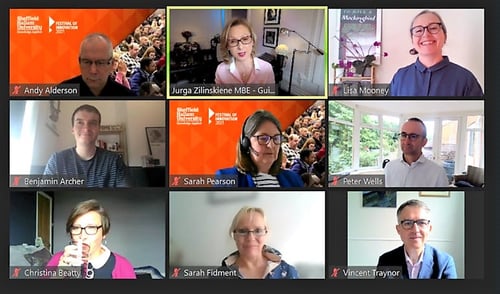
The Age of Wild Experiment: The Pandemic's Impact on Business & People
Thank you for inviting me to share Guildhawk’s story of the past 15 months; the impact of the pandemic on our people, business and wider society.
I talked about my perspective on what it’s like to live and run business through a time of unpredictable actions and reactions, as we entered what I call The Age of the Wild Experiment, and why research, collaboration and innovation is more important than ever before.
I give some examples, including the amazing collaboration we have with Sheffield Hallam University, Innovate UK, the Department for International Trade in Asia, and others.
I established Guildhawk 20 years ago, and we’ve done lots of exciting stuff in that time, including many world firsts, the world’s most romantic word, the first emoji translator, translating the constitution of the Uzupis (the bohemian island in the heart of Vilnius in Lithuania) into Scottish Gaelic, translating for President Gorbachev’s 80th birthday, Dracula in the Dark, and being honoured by Queen Elizabeth and the late Prince Philip, Duke of Edinburgh.
I won’t bore you with the details, but have a look at Guildhawk’s Wikipedia page, and you’ll see that Wild Experiments are in our DNA.
Guildhawk CEO Jurga Zilinskiene discussing the impact of Brexit on SMEs with Boris Johnson
To set the scene, what do I mean by Wild Experiment?
Sounds a bit nutty professor, doesn’t it? Well it is a bit bonkers actually.
We are in an age unlike ever before in history; even the disintegration of the Soviet Union that I lived through doesn’t seem as nutty now.
Part of the global economy has closed down; health systems, logistics, and governments are being tested as if in a war-time setting, but fighting an invisible enemy. Business sectors like hospitality and travel are on life support systems, and we don’t know if they will survive.
In the UK, 2-3m of the population is still being paid wages by the taxpayer that will have to be repaid by our grandchildren. Some of these people are using this time to retrain. (Later, I’ll mention what we’ve done with Harvard Business School.) Other people are not retraining or doing voluntary work, they are at home, trying not to be a burden on the health service.
Through another Wild Experiment, corporations and governments have discovered that digital transformation, remote working, flexible hours, and virtual conferences, are not as difficult to achieve as many insisted for the past decade. Good experiment! In fact, stressful commuting and distractions in an open-plan office may actually have contributed to a serious lack of productivity before the pandemic.
The Wild Experiment with public spending has produced vaccines in record time; has prevented people from starving, and losing their homes and businesses; and companies in the digital space like Zoom and Amazon have skyrocketed.
Guildhawk signed our first agreement in a virtual conference setting with partners in Hong Kong, and probably for the first time in history, the host for the ceremony was not a real human but a multilingual avatar! More later about the Guildhawk Voice technologies we launched during the lockdown.
The Wild Experiment will have positive changes for business and for people for generations to come if we embrace this opportunity. But I will tell you what we need to do to succeed.
It is difficult to see the future when you are in emergency mode. However, when you look back, you see that the ones that flourished did so because they planned, prepared, worked together with others and invested into what they saw as the future.
They were not gambling or speculating, but they were betting on a couple of outcomes.
At the dawn of the movie age, Charlie Chaplin and the Warner Brothers all bet on future technologies and customer habits. Some people couldn’t see talkies being popular until Al Jolson (a fellow Lithuanian) recorded the first talking movie, the Jazz Singer, in 1929.
Some of my business friends bet on the future, they pivoted and did well. I will tell you about them in a minute.
Before we talk about other people though, I have a question for you.
How have you personally pivoted to work differently in readiness for the post-pandemic world that is coming? Please note this down or feel free to share it in the chat.
I would love to hear your thoughts. I will give you a few seconds.
For years before the pandemic, we knew there were two major threats to UK business: Brexit and a global pandemic. Many leaders planned for Brexit but who planned for a pandemic? Not many, it seems. In fact, chief risk officers have told me that if they had stressed the need for a pandemic plan, they would have been laughed out of the boardroom!

Sheffield Hallam University’s Innovation Conference 2021
Guildhawk had Brexit at the top of our risk agenda, and another matter that wasn’t a pandemic: the risk of not managing the gig economy efficiently in a globalised world. Preparing for Brexit was something we mitigated thanks to our systems and processes. We’ve refined these and tested them for years. They are ISO:9001 quality certified, and we were the first in the world in our sector to be certified under ISO:27001, the information security standard.
These are important to our clients like Bloomberg, Shell International, Universal Studios, and the British Standards Institute because they want 100% assurance that their information is safe with us, come what may. That means testing.
You may ask, what do these ISO standards have to do with operating during the pandemic? Well, they helped us to immediately switch to 100% remote working without any disruption to business.
These procedures worked because we placed another bet a few years ago. We knew that digital transformation meant the Smart Cities of the future would be interconnected, meaning the workforce of tomorrow will operate from everywhere, even the sandy and sunny beach. The art is to do it safely and efficiently, and that means investment in technology and people.
Think about the movie industry again, and how gaming and films have merged. Thousands of CGI animators work around the clock and around the world to make the latest Marvel comic superhero movie come to life.
20 years ago, when I founded Guildhawk, I knew there was nothing to compare with the genius of the human brain, and the infinite number of synapses that create experiences. Linguists that speak two, three or four languages have beautiful minds. I also knew they needed technology to help them harness that power, like creatives in the movie and games industry. So, I started developing technology to help people to be highly productive when they collaborate.
Today we call it the Gig Economy. It should be called the Collaboration Economy because it applies to almost all of us. I began by building a software system called QCS+ because I couldn’t find anything that was designed for the Collaboration Economy. I actually hired university professors to teach me to code so I could build it, but that’s another story.
I’ll let you into a secret. Having coded, I saw that clean data is at the heart of innovation. So, in 2008, we began building an ultra-pure data warehouse of translated material, produced, and created by the greatest minds on earth. We did this not to replace humans with robots (some tried but failed, because one cannot replace the other, they complement each other).
However, we knew that, in the future, Artificial Intelligence would need to be trained on ultra-pure data. That’s because, like a pool of spring water, a tiny droplet of toxic liquid will pollute the pool and make it undrinkable.
Some people wondered why we made such a fuss about this approach, and took such a long-term view on everything. It started to become apparent in 2019 when we formed a Knowledge Transfer Partnership with Sheffield Hallam University backed by Innovate UK to build new software to manage the Collaboration Economy based on QCS+.
It was apparent again during the pandemic when we launched two new software products, GAI Aided and Text Perfect. We couldn’t have done this without long-term plans, systems and brilliant collaboration with dynamic, trusted partners who share our values.
Other companies have also pivoted and flourished. In Yorkshire, where I am a regional ambassador for the Be the Business Movement, Dan – the owner of XSEM, a superb events business – whom I met on the Goldman Sachs 10,000 Businesses Programme, planned for the future and moved into virtual events. It took courage to bet on this. However, it was planned and became a brilliant success; take a look at his website. His Wild Experiment paid off!
Can you think of people who have also used Digital Transformation in other sectors? Sectors where they would never have dreamt of doing things digitally?
I can. One of the most creative Wild Experiments I’ve seen was carried out by my young bandleader friend, Alex Mendham, whose orchestra performs the most authentic songs and music from the 1920s and 30s for audiences across the globe.
I adore this fun, romantic music, and we were working together on his new album and a glamorous transatlantic crossing to New York, but this had to be postponed along with all his other concerts. Covid has been devastating for musicians. A creative genius, Alex embraced digital tech to produce the world’s first 1930s-themed ‘Lockdown Broadcast’; a show in which musicians recorded their pieces at home and these were weaved together for broadcast online.
This uplifting show was an enormous success, with fans tuning in across the globe. When lockdown eased, the orchestra assembled to record their new album and performed an online event for a global audience. Their renewed energy, vigour and creative gusto is so visible in their performances – do watch them, they’re an inspiration!

Guildhawk signs Memorandum of Understanding with Gammon Construction and the UK Department for International Trade
Our ultra-pure data lake nourishes the Artificial Intelligence in Guildhawk Aided. Also check out our Guildhawk Voice digital human avatars, the world’s latest software that turns text to speech in over 50 languages to make videos in minutes. I am one of those avatars and so are our directors.
An Avatar presenter hosted the ceremony with our new Partner Gammon Construction in Hong Kong. Gammon traces its history back to 1832 and constantly innovates and experiments to stay ahead. They do this by maintaining a long-term vision and collaborating and bringing experts together from across sectors and disciplines.
Who would have thought that Guildhawk and Gammon Construction would become kindred spirits?
How can you use some Wild Experiments in your business to prepare for the future?
Here are my tips:
Embrace remote working and flexible work practices like so many are doing including Nationwide Building Society. We decided to surrender our office leases and downsized to flexible space in a brand new skyscraper. We always knew our tech systems could allow this; we just resisted it because of the popular believe that people cannot collaborate effectively unless they are in the same space. But you cannot impose things on people.
So, before we made the decision to give up our expensive offices, we surveyed all our people and to our surprise they loved the idea, and wanted to keep working from home because it gave them the flexibility they wanted. And no one missed the daily commute!
15 months on, they still love the idea, and love the idea of an occasional ‘office experience’ for team or project meetings, monthly 121 catch ups with their managers, and this arrangement works perfectly for them and the business. Productivity has gone up by 20%, and the team produced more new products that required close collaboration and creative thinking in one year than in the previous 5 years!
Things to watch out for:
Not everyone has a suitable homeworking environment. Workplace risk assessments are crucial. Humans are social animals, so bring them together regularly online and in person, and have open and frequent communication channels. Our online gin tastings and games are fabulous fun. However, we miss the dance floor, and have nice get-togethers planned.
If you make cash savings or productivity gains, reinvest in your people. We used money saved on rent to send our people on management training at Harvard Business School to prepare them for the future.
Have a physical space that inspires creativity, collaboration and Wild Experimentation. We will take a physical space again. However, this will include studios, accommodation and other features.
Help people to become leaders who can control their own destiny, and collaborate with others to make the world a better place. Harvard helped us and so did Zoom, we’ve all visited each other’s homes like we could never dream before. That’s a privilege and has made us closer.
What I would do differently with hindsight?
In 2019, following a meeting I had with the Prime Minister, our Chairman Ian Miller and I wrote to Boris Johnson, calling on him to protect SMEs in the event of a Brexit crisis. We established the SME War Room too and David Clarke, our Head of Integrity, established and led the COVID-19 Fraud Watch for the Fraud Advisory Panel charity.
This task force united over 70 trusted partners including Cabinet Office and the police, and shared fraud intelligence to protect businesses. However, I wish we had done more and alerted other businesses who were not prepared.
And to finish, what am I doing for the future?
We are working on a fantastic AI project that will blow your mind away but it is top secret. Our collaboration with Sheffield Hallam University is going from strength to strength. Guildhawk is now part of the government’s Scaleup Edge programme for rapid growth and will be seeking our first ever investment. Growth markets for us are SE Asia and the US.
We’ve formed The Mendham Guildhawk Song Company that will unveil a world-first for the music industry in the autumn. And we are working with Britain’s leading private hotelier to plant a historic orchard for posterity.
The Age of the Wild Experiment is nutty and challenging, but when your heart is in it, you have nothing to fear and lots to gain.
Now, I would love to hear your answers to my question about what you are doing differently in readiness for the post-pandemic world that is coming, and will take a question or two.
Thank you.

